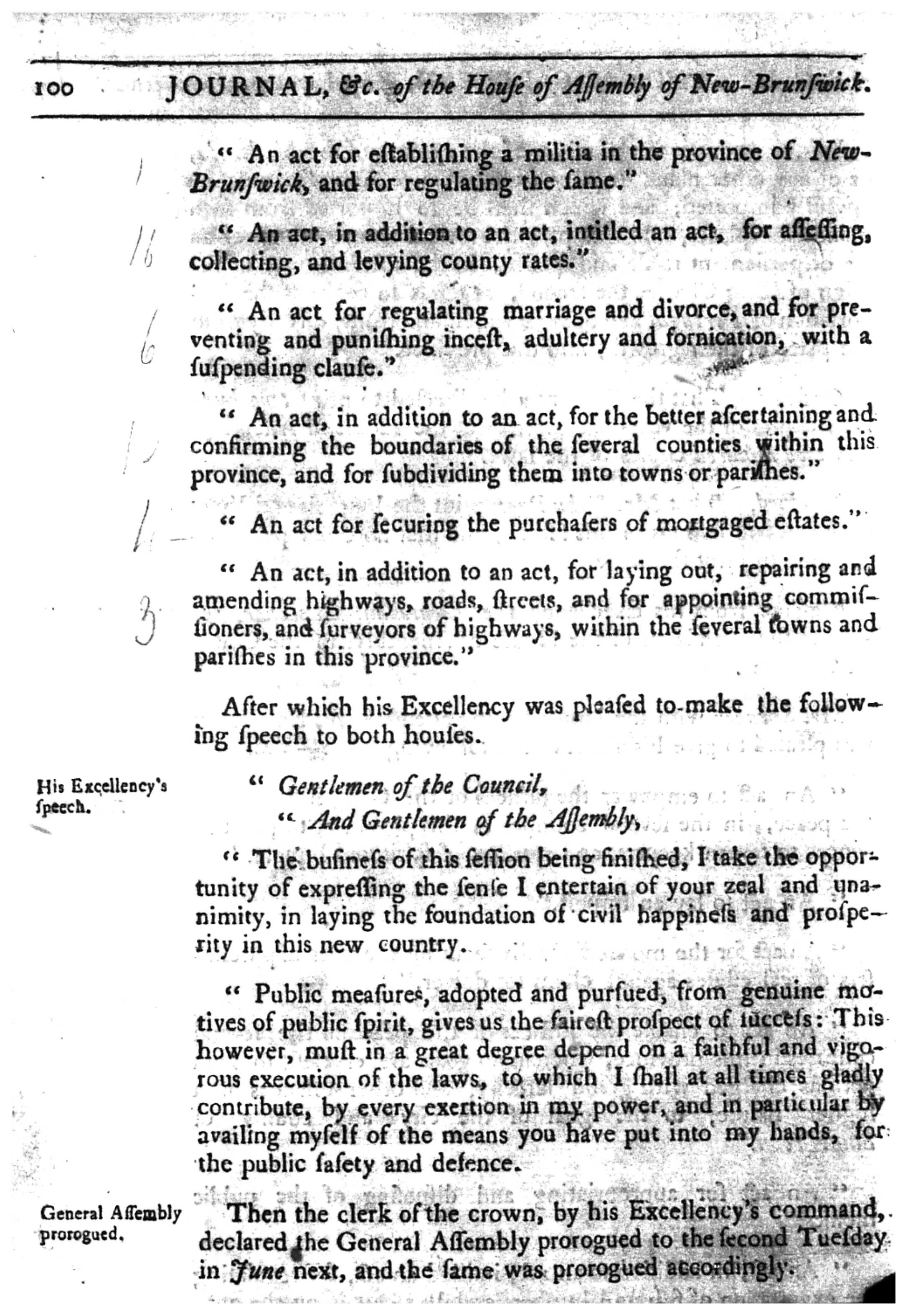- Submitted on
- 0 comments
For many living in present day New Brunswick, Canada party politics has become normalized. People vote for the party that has the most agreeable party platform, and the elected Member of the Legislative Assembly becomes an ambassador of the party first and their riding second. Many do not know that party politics was imported into New Brunswick with the signing of Confederation in 1867. Prior to 1867, New Brunswick’s House of Assembly was divided by the local counties only. The holdings of The Loyalist Collection , in particular material relating to the House of Assembly, has helped to shed light on this fascinating subject of political tradition of the late eighteenth and nineteenth centuries. This political reality for New Brunswick loyalists, however, has remained largely unexplored by academic historians.
(Image of an oil painting displayed in Carleton Hall, University of New Brunswick)
During their inaugural meeting in 1786, the New Brunswick House of Assembly and Council were informed of the spirit that ought to guide them into the unforeseen future. In one of the most important speeches in the history of New Brunswick, Thomas Carleton noted that:
The liberality of the British Government to the unfortunate loyalists in general, and the peculiar munificence and parental care of our most gracious sovereign, to those of them settled in New Brunswick, call loudly for every return that an affectionate and favoured people can make; and I am persuaded you cannot better shew your gratitude on this behalf for the many unexampled instances of national and royal county, than by promoting sobriety, industry, and the practice of religion, by discouraging all party distinctions amongst us, and inculcating the utmost harmony between the newly arrived loyalists and those of his Majesty’s subjects formerly resident in the province. And gentlemen, it is with real pleasure that I declare, that our prospects are so favourable that your exertions for those beneficial purposes can scarcely fail to render this asylum of loyalty the envy of the neighbouring states and that, by exercising the arts of peace, they who have taken refuge here will not only be abundantly recompensed for their losses, but be enabled to enjoy their connection with the parent state and retain their allegiance for the best of kings, which their conduct has proved they prize above all considerations.
Government of New Brunswick, Journal of the Votes and Proceedings of the House of Assembly of the Province of New Brunswick (Saint John: Christopher Sower, 1786), 6–7.
What is reflected in this nineteenth century speech are the foundational values upon which the House of Assembly internalized. Often overlooked is the fact that there was a real effort made to create a political institution that was not divided along party lines. This effort succeeded in many ways and is reflected in the electoral system that New Brunswick largely adopted from Nova Scotia. While the county system did not completely eliminate opposition in the House, it was limited to individual elected officials. Although it is not possible to quantify the impact the impact that the absence of party politics in colonial New Brunswick had, I argue that the New Brunswick House of Assembly was able to gain the institutional power that it did because its members were, for the most part, working on projects that concerned their shared interests.

While political history is not as popular as it was once with New Brunswick historians there remains an important gap to be filled in this area. The administrative and electoral structure of the province guided the house of the executive forward in their shared responsibly to build New Brunswick into a strong and vibrant province. Based on the excerpt above it is clear that political division along party lines was not considered to be an acceptable form of governance. For now, it would seem that historians have barely scratched the surface on nineteenth century New Brunswick. For those whose interest I have peaked, I encourage you to begin with The Loyalist Collection.
New Brunswick House of Assembly Records in The Loyalist Collection:
- Draft Minutes : 1786.
- Journal and Votes of the House of Assembly of the Province of New Brunswick : 1786 - 1819.
- Papers : 1785 - 1830.
- Calendar of the Papers of the House of Assembly, 1786-1835.
Zachary Tingley has recently defended an MA thesis successfully in history at the University of New Brunswick and previously worked as a student assistant in the Microforms Unit.

Add new comment